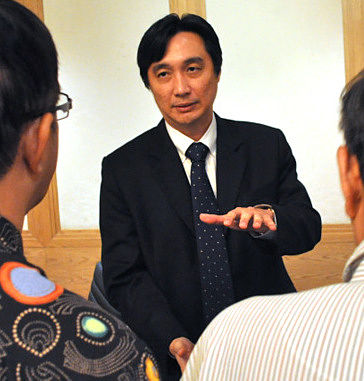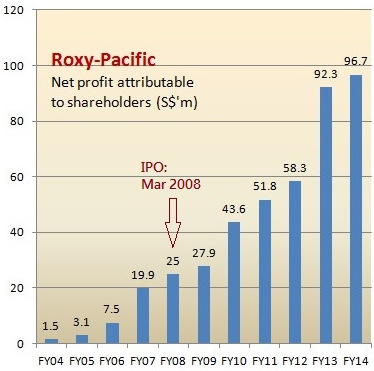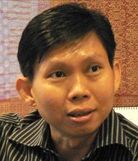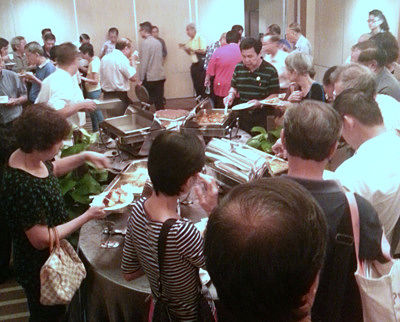 Time & date: 10 am, 27 March 2015
Time & date: 10 am, 27 March 2015Venue: Grand Mercure Roxy Hotel
SHAREHOLDERS were keen to ask questions and the CEO and his management team fielded them for about an hour, until no one else stood up with further questions.
 Teo Hong Lim, Chairman & CEO of Roxy-Pacific Holdings. NextInsight file photo.Key takeaways from the Q&A session:
Teo Hong Lim, Chairman & CEO of Roxy-Pacific Holdings. NextInsight file photo.Key takeaways from the Q&A session:» Why has the dividend payout not increased? What is Roxy's business strategy in a challenging Singapore market?
On why the dividend has been maintained at 1.913 cents a share, unchanged from FY2013, Chairman & CEO Teo Hong Lim said the payout is very much based on Roxy-Pacific's recurring income -- which comes from the hotel business.
While the group's profits have risen over the years, the fact is much of the profit came from property development projects in Singapore, and the market is cyclical.
"It could be a good strategy to retain capital to capture opportunities in the market," said Mr Teo.
He cited a time post-Lehman crisis, when Roxy-Pacific didn't have any landbank but when the property market started recovering, Roxy quickly made acquisitions of landbank, including the en-bloc purchase of Spottiswoode which reaped a high profit margin for the group.
 2014 was Roxy-Pacific's 10th successive year of record profit."The aim is to grow the mid- and long-term value, increasing the asset value per share. By growing the assets and the profits, shareholders can benefit from higher dividends and share value," he said.
2014 was Roxy-Pacific's 10th successive year of record profit."The aim is to grow the mid- and long-term value, increasing the asset value per share. By growing the assets and the profits, shareholders can benefit from higher dividends and share value," he said.Despite the Singapore market being in the doldrums, Roxy-Pacific will seek out opportunities there and not forsake it. In the meantime, it has also been going overseas.
"Singapore is our key focus where we will do more than 50% of our business. Overseas, at the moment we have decided to focus on Australia and Kuala Lumpur."
In Australia, Roxy has struck up partnerships with well-known names Aviva and Hostplus, and made its fourth investment to date -- a large tract of industrial land which could be re-zoned as residential within two years.
» What's the impact of the government's cooling measures on Roxy?
Mr Teo said Roxy had been intensively trying to sell its remaining property projects. The projects are 2-3 years away from their respective deadline after which an extension fee is payable to the government.
(Developers have up to five years to finish building a project and two more years to sell all the units. To extend the sales period, developers pay 8 per cent of the land purchase price for the first year of extension, 16 per cent for the second year and 24 per cent from the third year onwards. The amount is pro-rated based on the proportion of unsold units.)
Mr Teo cited Trilive, for which Roxy has changed its reward structure for agents. The project sold only 20 units last year but has sold up to 60 units now.
Form a subsidiary to buy leftover units? It would be a painful move, as it would incur 18% stamp duty, replied Mr Teo.
 CFO Koh Seng Geok. File picture.» What is the future capex for hotels?
CFO Koh Seng Geok. File picture.» What is the future capex for hotels? A shareholder noted that the capex has jumped from S$7.8 million in FY13 to S$43.4 million in FY2014. CFO Koh Seng Geok said the increase was attributable to the acquisition of a hotel in Kyoto and land in Phuket.
Going forward, the land in Phuket would need up to S$20 million to develop into a resort while the Kyoto hotel, up to $8 million to refurbish it.
The Kyoto hotel, which is vacant now, is expected to re-open for business by year-end while the Phuket site will need up to two years of redevelopment.
First, giving the thinking behind the expansion of the hotel business, Mr Teo said Roxy is building up its recurring income base.
In Australia, its partnership with Aviva will seek to to acquire and own a series of hotel development opportunities in key cities in Australia. A modular completion method will speed up the construction of the hotels.
While they will offer recurring income, the assets could also be spun-off as a REIT, he said.
Mr Chris Teo, the executive director overseeing the hotel segment, said the target destinations are stable and mature in terms of tourism arrivals.
 Shareholders tucking into a spread of food after the AGM last Friday. NextInsight photo» NAV is 33.54 cents but Adjusted NAV is 72.11 cents a share. How is this derived?
Shareholders tucking into a spread of food after the AGM last Friday. NextInsight photo» NAV is 33.54 cents but Adjusted NAV is 72.11 cents a share. How is this derived? CFO Koh Seng Geok explained that the Grand Mercure Roxy hotel is recorded at historical cost in the books. Its book value is about $90 million after depreciation. The market value of the hotel was $553 million as at end-2014.
The "revaluation surplus" (which is the difference between the market value and book value of the hotel) is then divided by the outstanding shares of Roxy and the result added to the NAV to get Adjusted NAV.
Roxy's investment properties (in Roxy Square and in Sydney), on the other hand, have market values that are captured in the NAV of Roxy. Mr Koh said the hotel is not classified as an investment property but as a "fixed asset".








this site. It's simple, yet effective. A
lot of times it's challenging to get that "perfect balance"
between usability and visual appearance. I
must say that you've done a fantastic job with this.
Additionally, the blog loads super quick for me on Safari.
Outstanding Blog!
Also visit my web page - New Condo @ Kovan (Cassie: http://www.trilive-showflat.com/)